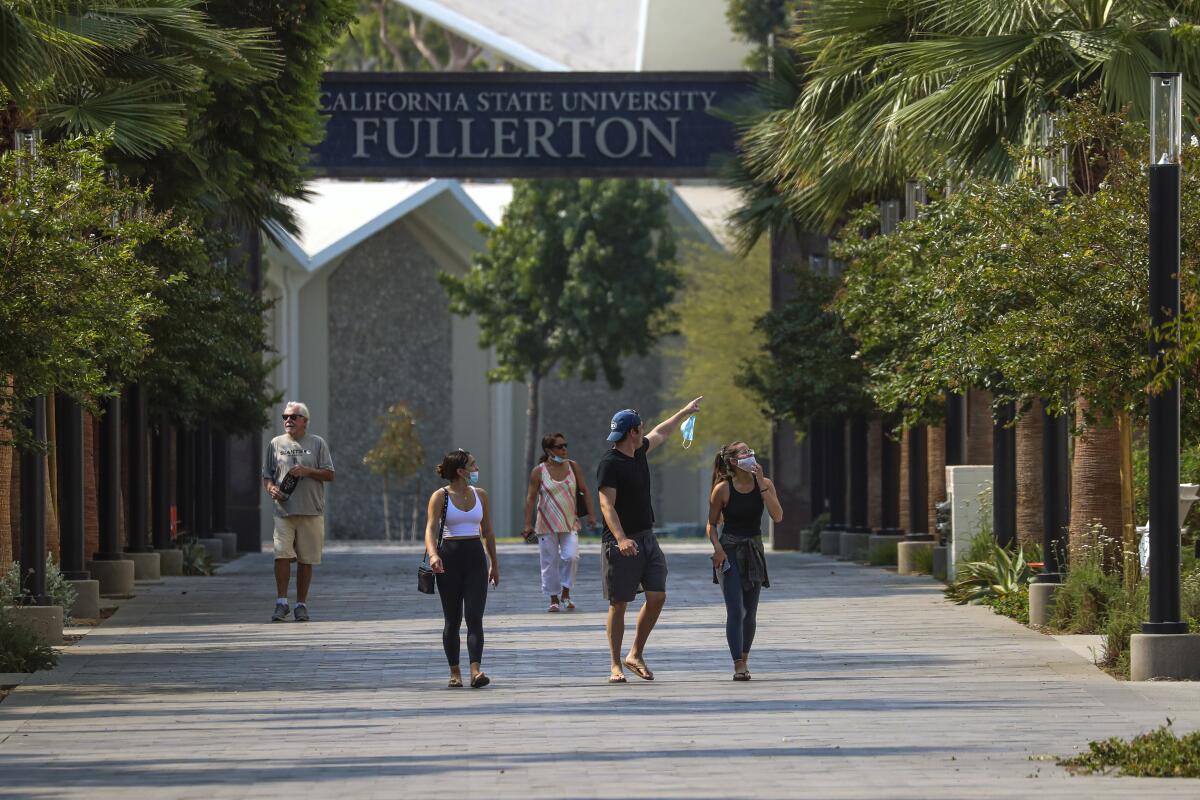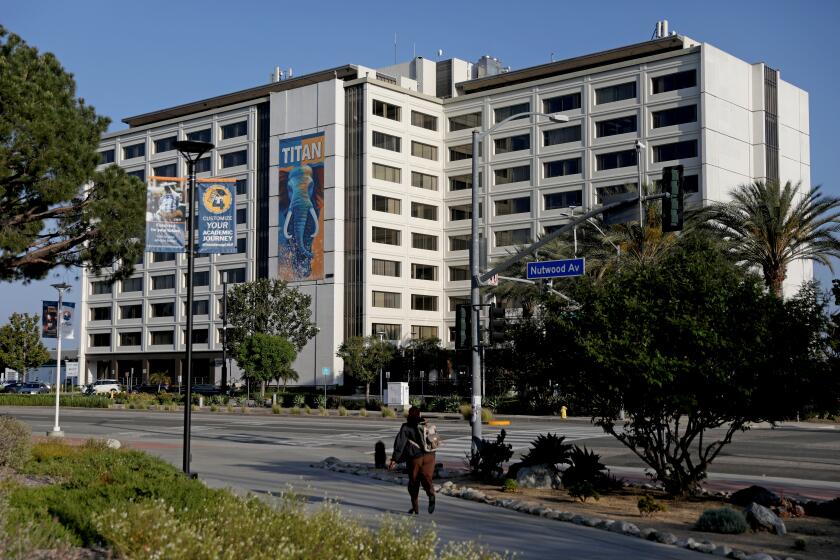CSU trustees approve 6% annual tuition increase over fierce student protests

- Share via
California State University trustees on Wednesday approved a 6% annual tuition increase for the next five years despite fierce opposition from scores of students who say they are financially struggling and can ill afford to pay more to attend college.
The increase — the system’s first since 2017 — is projected to raise $840 million over the five years and is badly needed to help bridge a $1.5-billion budget gap that has forced campuses to skip employee wage increases and building renovations, administrators said.
Trustees approved the tuition hike 15 to 5, even as they acknowledged the burden it would place on students. They said the university system direly needs the money to avoid painful cuts that would hurt the quality of education.
“What we have been doing with our budgets is deferring costs — not filling vacancies, deferred maintenance,” Chair Wenda Fong said. “It has constantly built up and built up.”
A new report reviewing Cal State’s finances found the university system is coming up 15% short of its total costs, leaving an almost $1.5-billion funding gap. The report recommends implementing tuition increases.
The two student trustees on the board, Diana Aguilar-Cruz and Jonathan Molina Mancio, voted against the increase. Aguilar-Cruz proposed scaling back the hike to four years, saying that even a small savings would help students. But her amendment failed.
She acknowledged the increased funds “will benefit students in the long term, in the years to come. But right now it will harm our students.”
For full-time undergraduate students, the tuition hike amounts to an increase of $342 per student to $6,084 in the 2024-25 academic year. By 2028-29, tuition would jump to $7,682, according to university documents.
The hike will help pay for employee pay increases, improve academic support and research and internship opportunities for students and enhance course options, administrators said. The system plans to earmark $280 million of the money raised from tuition increases for financial aid.
Since initially proposing a tuition increase earlier this year, Cal State officials have consistently said they plan to keep the system affordable for low-income students, many of them students of color. They say about 60% of the roughly 460,000 students enrolled in CSU will continue to have their tuition costs fully covered by financial aid.
The 23-campus system remains one of the most affordable four-year public higher education systems in the nation.
But students who descended on the trustees’ two-day meeting Tuesday for a public hearing and rally argued it is unfair to assume those students and their families can afford to shoulder the added costs.
Leila Cormier, a political science student at Sacramento State University, said she works three jobs at more than 40 hours a week to pay the 30% share of her tuition that financial aid does not cover. She constantly seeks out scholarships to avoid taking out loans.
The 20-year-old receives some help from her mother, but it’s a struggle each month to make her $1,500 in rent. She chose to enroll in the Cal State system for its relative affordability, but feels the system’s leaders are not taking into account students’ financial hardships.
“I don’t really feel like they’re listening,” she said. “We feel like they are ignoring us.”
Lt. Gov. Eleni Kounalakis, a trustee who objected to the plan, emphasized that the tuition hike would amount to a nearly $2,000 increase by the end of 2028-2029, which could force some students to drop out or extend the time it takes for them to graduate.
“We have done no work — no study, no data collection of what that increase is going to mean to our student body,” she said.
Kounalakis pushed to delay the vote. Students had also implored trustees to to delay the vote until November to give them more time to learn about the plan. At least one campus, Cal Poly San Luis Obispo, has not started fall classes.
But CSU officials told trustees they should not delay the vote because prospective students will begin applying to the system in October, and they want to give families ample time to prepare financially. Holding the vote early in the academic year also allows colleges enough time to prepare financial aid packages for students.
Voicing support for the hike, Trustee Leslie Gilbert-Lurie said keeping tuition flat for most of the last decade has led to poor campus conditions.
“Somewhere along the way, we gave people the impression that this system is magically going to create money to sustain itself,” she said. “And what we see instead as I’ve toured campuses [is] shocking disrepair of buildings, salaries we can’t pay.”
Fong noted that money generated through the tuition increases still won’t be enough to cover all of CSU’s needs. The system must still look for other ways to tighten its budget, she said.
“It is not going to fix and fully fund our deficit,” she said.
Terrie Kennon, president of the Black Student Union at Cal State Dominguez Hills, said she had learned of the proposal to increase tuition only a week ago through social media and the California Faculty Assn. She said the system had not done nearly enough to engage with students about the tuition hikes. She spent much of the week trying to inform her peers of the increase by hosting workshops on campus.
“I had three days to organize a protest on my campus, three days to gather as many students as possible to make this happen,” she said.
Molina Mancio, a student trustee, said the system must do more to communicate the implications of the hike with students.
“We can’t just throw numbers and graphs and Excel sheets at students,” he said. “A lot of students do not find that digestible, and we need to break it down so that students can understand this position because it is truly a hard position.”
The California Faculty Assn. joined students in opposition to the hikes. The union is one of several labor groups pushing for higher salaries but does not support increasing tuition to fund them. Charles Toombs, association president, has said the union favors cutting “administrative bloat.”
Students representing campuses as far north as Cal Poly Humboldt voiced their discontent on Tuesday. Jordan Guillory, a graduate student studying math, drove seven hours — leaving at 7 p.m. after teaching a class on Monday — from San Francisco State University to protest.
Guillory makes about $900 a month as a graduate student teacher — $800 of which pays for the room he rents in a converted garage. He borrowed $7,000 this academic year to pay for tuition and other costs.
As a graduate student, Guillory’s annual tuition is set to increase by $432 to $7,608 in the 2024-25 school year. For graduate students, by 2028-29 tuition would jump to $9,612, according to the system.
“I’d have to put that in loans and trust that this system is training me to get a job that can pay that off in a reasonable time,” he said. “I’m not necessarily sure that’s promising.”
The 23-year-old said he is thinking about going into teaching to qualify for loan forgiveness awarded to people who work in public service.
“If that doesn’t work, I’ll be in a lot of trouble in the future,” he said. “But I just choose not to think about that.”
More to Read
Sign up for Essential California
The most important California stories and recommendations in your inbox every morning.
You may occasionally receive promotional content from the Los Angeles Times.















